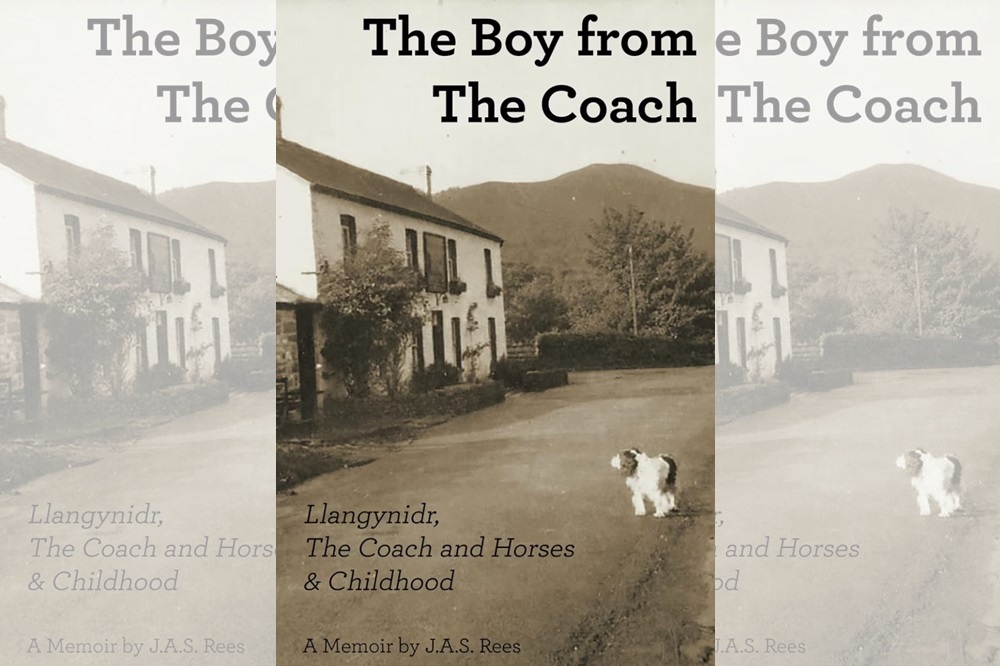Book review: The Boy from The Coach by J.A.S. Rees

Gaynor Funnell
In this memoir, Tony Rees, born in the 1930s, recounts his memories of the time he spent as a boy in the village of Llangynidr, situated 9 miles from Brecon, in Powys, Wales, a place he says ‘helped shape my life…’
His family had family ties with Llangynidr going back for centuries, and Tony’s memories and love from his time there spring from the pages. In the summer holidays, he was sent to stay with a relation of his mothers, a May Morgan, who lived at the local inn, The Coach and Horses, locally known as ‘The Coach’.
Initially he takes the train to get there, and this journey touched a chord as I was born in one of the villages mentioned, Pontsticill. The train, to Talybont-on Usk via the Merthyr and Dolygaer line, passed through the beautiful scenery of Vaynor, Pen y Fan, and Talybont reservoir, as well as ‘the small church that once catered for people long gone after their homes were drowned.’
On his first visit, he has to walk to the Inn once he’d arrived at the station, as there was not enough petrol in the car for the family to collect him, due to rationing during and following the Second World War.
Food was also rationed, although there are lovely descriptions of food still available; eggs from their own chickens, bacon, Swansea loaves, local butter and milk, home-made jam and cakes, own grown fruit and vegetables, even meat from their own chickens, with a vivid description of how to dispatch one.
When he was older, he travelled by bike, his ‘sit up and beg’ Royal Enfield, which had no gears, and later by his ‘drop handlebar’ sports bike.
Wherever he travelled, there was always something new to experience; a shepherd with his dog, hill ponies, stopping to swim in the river Usk. ‘But best of all was the joy of freedom.’
‘The Coach’ was a post house situated along one of the roads between Crickhowell and Brecon. There was no mains electric until 1952, so lighting was provided by candles, oil lamps, and gas mantles, until a generator was purchased.
There are in-depth descriptions of this building, the bar, and the people held within it. May Morgan comes across as a strong character, able to command her husband and the locals ‘…with just a look, showing that argument would be pointless…’
She seems to have a Craven A cigarette permanently attached to her mouth ‘complete with a miraculously held inch of cigarette ash…’ which accompanies her everywhere, as she cooked, talked, knitted.
Paddy, the springer spaniel who went with Tony on his walks, is as much as a character as any of the people who frequent the inn. I love that for Tony, they didn’t go on any special walks, as ‘…all walks were special.’
A thing that stands out for me is the freedom he had, able to be out all day with no supervision, something unheard of today.
He invites us to walk alongside him, along the towpath, lock and aqueduct next to the canal, among the shallows and falls of the Crawnon river, up to Tor y Foel, over the moorlands of Mynydd Llangynidr.
‘The countryside changed every day, every hour: shifting clouds; change of wind; rising and setting sun.’
He describes and sometimes partakes in the countryside skills of scything, hedge laying, shooting rabbits, hand-milking cows, trout fishing, searching for elvers.
As a contrast, the war runs through this rural life. Apart from rationing, Home Guards locally known as ‘The Mounties’ did their rounds, there were military bases and prisoner of war camps nearby, some prisoners working in the farms and forests. Tony remembers the celebrations of VJ day when the war ended.
Hiraeth, the word ‘that only Welsh exiles can understand’, runs as deep as the rivers Crawnon and Usk throughout this book. It depicts an almost forgotten world, a seemingly simpler world, the world of a community where everyone knows and looks out for one another.
For myself, it also brings back memories of similar tales my father used to tell me, my own ‘hiraeth’.
It brings an awareness of the things we take for granted today, hot water, lights at the flick of a switch, the inevitable mobile phone.
It also struck me that not only was I reading the words describing a beloved place, frozen in time, but maybe there were things inherent in this time that we could take forwards into our future, or even use them as lessons for our future, in this time of everything change.
The Boy from The Coach: Llangynidr, The Coach and Horses & Childhood by J.A.S. Rees is available to buy here.
Support our Nation today
For the price of a cup of coffee a month you can help us create an independent, not-for-profit, national news service for the people of Wales, by the people of Wales.





